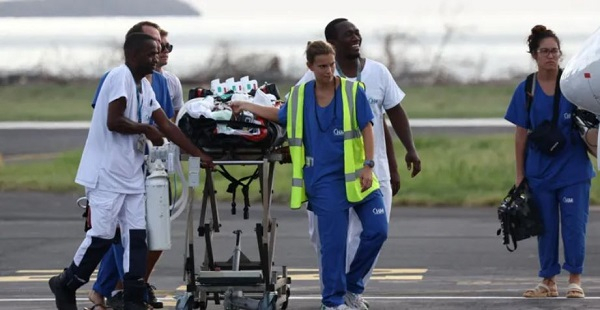
MAMOUDZOU, Dec 20 (NNN-AGENCIES) — Tens of thousands of people are still without access to water in Mayotte after the French Indian Ocean territory was devastated by Cyclone Chido, as rescuers race to find missing people.
Preliminary figures from France’s interior ministry report 22 people have died, but Mayotte’s prefect has warned the toll could rise to thousands.
Health workers are concerned infectious diseases could spread, as residents have reported clean drinking water shortages and shops are rationing supplies. More aid arrived on Wednesday.
Islanders spent a first night under curfew between 22:00 local time on Tuesday and 04:00 on Wednesday as part of measures to prevent looting.
“Everyone is rushing to the stores for water. There is a general shortage,” Ali Ahmidi Youssouf, 39, said on Wednesday while walking with a few bottles in his hand in the community of Pamandzi off the archipelago’s main island.
The authorities have said their priority is to get damaged water plants back up and running.
On Wednesday, authorities said the water system had been partially re-established and they hoped 50% of the island’s population would have access to water by the evening.
The French government said 120 tonnes of food were distributed on Wednesday, while President Emmanuel Macron was scheduled to visit Mayotte on Thursday.
Half the territory remains without power. A newly imposed curfew requires people to stay in their homes for six hours overnight to prevent looting.
“We don’t have electricity,” Ambdilwahedou Soumaila, the mayor of the capital, Mamoudzou, told Radio France Internationale. “When night falls, there are people who take advantage of that situation.”
Mayotte is one of the poorest parts of France, with many of its residents living in shanty towns.
Chido – the worst storm to hit the archipelago in 90 years – brought wind speeds of more than 225km/h on Saturday, flattening areas where people live in shacks with sheet metal roofs and leaving fields of dirt and debris.
Rescuers are now searching for survivors in the ruins, such as in Mamoudzou, while trying to unblock roads and clear rubble and downed trees.
Francois-Xavier Bieuville, Mayotte’s prefect, previously told local media the death toll could rise significantly once the damage was fully assessed.
He warned it would “definitely be several hundred” and could reach thousands.
Officials have said that Mayotte’s relatively low official toll is due to many areas being inaccessible and some victims already being buried.
The difficulty is compounded by uncertainty about Mayotte’s population size.
The territory officially has 320,000 inhabitants, but authorities estimate about 100,000 to 200,000 undocumented migrants may be living there.
Initial figures from the interior ministry show that 1,373 people in Mayotte were injured.
France’s newly instated Prime Minister François Bayrou told parliament on Tuesday that there were “200 badly wounded and 1,500 wounded in a relative state of urgency”.
“I have never seen a disaster of this magnitude on national soil,” Bayrou said later in a post on X.
“I think of the children whose houses have been swept away, whose schools have been almost all destroyed and whose parents are extremely distraught.”
The government said it was sending in supplies via an air bridge from its other Indian Ocean territory, Reunion Island.
On Wednesday, 100 tonnes of food were distributed on the larger island of Grand-Terre in Mayotte, while 20 tonnes were handed out on the smaller island of Petite-Terre.
A French navy support and assistance vessel also arrived in Mayotte on Thursday morning with 180 tonnes of freight on board.
The ferry linking Mayotte’s two main islands resumed services on Wednesday, allowing some people caught out by the storm to return to their families. — NNN-AGENCIES



